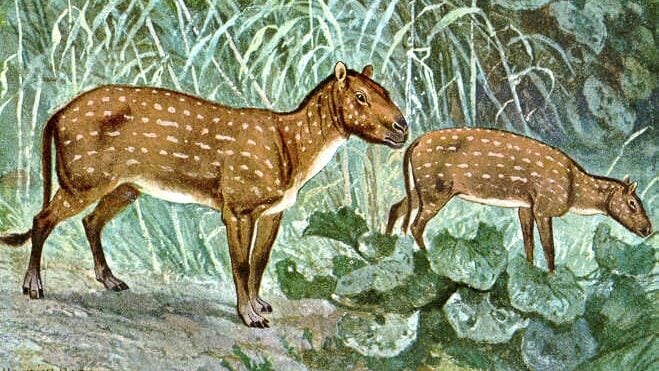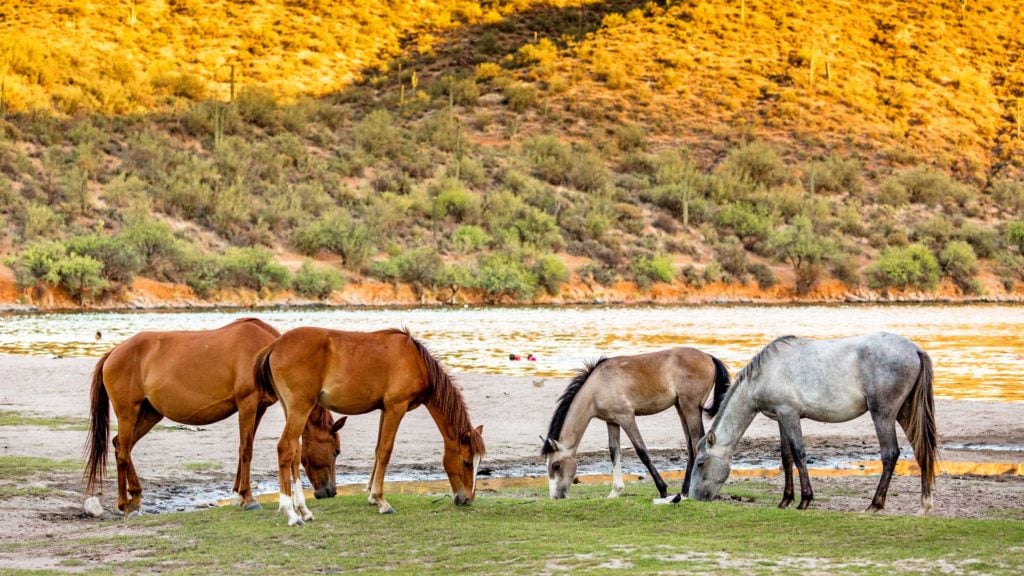Last updated: May 3, 2025
“Are horses native to North America?” The answer is unequivocally yes. Scientific evidence and historical records confirm that horses first appeared on the North American continent over 50 million years ago. Horses evolved, thrived, and then mysteriously disappeared around 10,000 years ago, only to be reintroduced by Europeans in the 15th and 16th centuries. Despite this long absence, their deep-rooted history on the continent confirms their native status.
As a passionate historian and horse lover, I’ve dove deep into this fascinating subject to bring you a narrative that spans millions of years. This story encompasses horses’ evolution, migration, and eventual reintroduction, highlighting their profound impact on the continent’s ecological and cultural landscape.

Origin: Evolved in North America over 50 million years ago.
Extinction: Disappeared around 10,000 years ago.
Reintroduction: Brought back by Europeans in the 15th and 16th centuries.
Legacy: Integral to Native American cultures and ecosystems.
The Prehistoric Origins of North American Horses
Horses originated in North America, evolving from small, dog-sized creatures into the large animals we know today. Over more than 50 million years, they adapted to shifting environments—from dense forests to open prairies—which shaped their size, stamina, and other physical traits. One such trait is their strong, naturally self-maintaining hooves—an adaptation that remains evident in today’s wild horses. Learn more in Why Wild Horses Don’t Need Shoes: Natural Hoof Care.
Although horses went extinct in North America around 10,000 years ago, their evolutionary legacy remains clear. For a broader look at their cultural and historical impact, explore A History Of Horses: America’s Equine Influence.
Migration and Extinction: A Historical Puzzle
The disappearance of horses from North America around 10,000 years ago remains one of history’s great mysteries. Theories suggest climate change and overhunting by early humans contributed to their extinction. When Europeans arrived centuries later, horses once again graced the North American plains, forever changing the cultural and ecological landscape.

The mystery of horses’ disappearance and their subsequent reintroduction by Europeans is a testament to their enduring legacy. These events underscore the horses’ adaptability and their significant role in shaping the history and cultures of North America.
The Impact of Reintroduction
The reintroduction of horses had profound effects on the cultures and economies of Native American societies. The horse became a symbol of power and prestige, a crucial asset in hunting and warfare, and a vital tool for transportation and trade. Horses’ adaptability to North America’s diverse climates and landscapes is a testament to their evolutionary origins on the continent.

Archaeological Evidence of the Horse’s Origin in North America
To fully grasp this story, we look to archaeological evidence, such as the 3.5 million-year-old Hagerman horse (Equus simplicidens) fossils found in Idaho. This comprehensive fossil evidence provides a more complete outline of the modern horse’s evolutionary lineage than any other animal. Citation: Biology LibreTexts. (2023). 18.5E: The Fossil Record and the Evolution of the Modern Horse. Retrieved from LibreTexts.
Similarly, post-reintroduction cave paintings and artifacts from Indigenous cultures depict horses’ renewed presence and significance in North America. These visuals not only corroborate the historical narrative but also bring to life the profound legacy of horses on this continent.
Check out this informative YouTube video about horse evolution.
Genetic Studies: Confirming the Native Status of Horses in North America
Recent genetic research confirms that today’s horses are direct descendants of those that once roamed North America. When Spanish explorers reintroduced horses in the 15th and 16th centuries, they brought influential breeds like Andalusians and Paso Finos, leaving a lasting genetic imprint on equine populations across the Americas. Learn more in our detailed guide on Spanish Horse Breeds: Andalusians, Paso Finos, and More.
This genetic link closes the gap in our understanding of their history, solidifying their status as native inhabitants of the continent. Source: UC Santa Cruz News. (2021). Ancient horse DNA reveals gene flow between Eurasian and North American horses. Retrieved from UCSC News.
Here’s a good YouTube video about horses in North America during the Ice Age.

The Role of Horses in Indigenous Cultures
The reintroduction of horses transformed Indigenous cultures, enhancing social structures, hunting practices, and warfare. Horses became symbols of power and freedom, integral to the identity of many Native American tribes.
Source: National Science Foundation. (2023). Horses have been part of Indigenous cultures longer than Western historians thought.

FAQs: Are Horses Native to North America
When did horses go extinct in North America?
Horses went extinct in North America around 10,000 years ago, at the end of the last Ice Age. This extinction event coincided with a period of significant climate change and also affected many other large mammals.
Why did horses go extinct in North America?
The exact reasons for horses’ extinction in North America are not definitively known. Still, it is believed to be a combination of factors, including climate change, habitat loss, and possibly overhunting by early human inhabitants.
How were horses reintroduced to North America?
European explorers and settlers reintroduced horses to North America, starting with the Spanish in the 15th and 16th centuries. These horses were descendants of those who migrated to Eurasia via the Bering Land Bridge.
When was the horse first discovered?
It’s not easy to say when horses were first discovered. However, through science, we know that horses have existed for 55 million years and were domesticated in Kazakhstan 5,500 years ago.
What country did horses originate from?
Horses originated in the United States and other countries in North America more than 50 million years ago. However, they went extinct on the continent about 10,000 years ago.

Conclusion: The Legacy of North America’s Native Horses
The history of horses in North America is not just a tale of survival and adaptation; it’s a narrative deeply intertwined with the continent’s ecological and cultural fabric. From their prehistoric origins to their significant role in Indigenous cultures and shaping American history, horses have indeed reclaimed their legacy as native inhabitants of this land.
As we continue to explore North America’s past, the horse symbolizes the enduring connection between humans and the natural world. Their story reminds us of our shared history and the profound impact these majestic creatures have had on our lives.
We’d love to hear from you! Do you have a personal story or insight related to the role of horses in North American history? Perhaps a family tale, a memorable encounter, or thoughts on preserving this heritage? Share your stories in the comments below or on our social media platforms. Your experiences enrich our collective understanding and appreciation of these fascinating animals.
Stay Connected: If you’re passionate about history, horses, and the environment, consider subscribing to our newsletter. You’ll receive updates on new articles, exclusive content, and invitations to participate in discussions and events focused on our equine friends and their place in our world.
What’s your view on the reintroduction of horses to North America and its impact on Indigenous cultures and the environment? Let’s start a conversation and delve deeper into this intriguing aspect of our history.
References and Further Reading
For those interested in exploring this topic further, here are some recommended resources:
- Scientific Studies and Articles:
- “Ancient horse DNA reveals gene flow between Eurasian and North American horses” – UC Santa Cruz News. Read more
- “The Fossil Record and the Evolution of the Modern Horse” – Biology LibreTexts. Explore here
- Books:
- “The Horse: The Epic History of Our Noble Companion” by Wendy Williams
- “Wild Horses of the West: History and Politics of America’s Mustangs” by J. Edward de Steiguer
- Documentaries:
- “Unbranded” (2015) – An epic journey across the American West with four men and sixteen mustangs.
- “American Mustang” (2013) – Exploring the plight of wild mustangs in the United States.
- Organizations:
- The American Wild Horse Campaign – Visit Website
- The Equine Heritage Institute – Learn More

About the Author: Miles Henry
Lifelong Horseman | Racehorse Owner | Published Author
Miles Henry brings over 25 years of hands-on experience training and owning Thoroughbred racehorses. Raised with Quarter Horses and Appaloosas, he’s spent a lifetime learning from horses—on the track, in the barn, and in the field. Today, he runs a small but successful racing stable in Louisiana and shares real-world insights on HorseRacingSense.com, helping horse owners, fans, and bettors navigate the sport with confidence.
📚 Books: View Miles’s books on Amazon »
🎧 Podcast Guest: Animal Tales Ep. 32 |
YouTube Interview
📩 Newsletter: Sign up for racing tips and horse care advice »
🔗 Follow Miles:
Twitter |
Facebook |
YouTube



